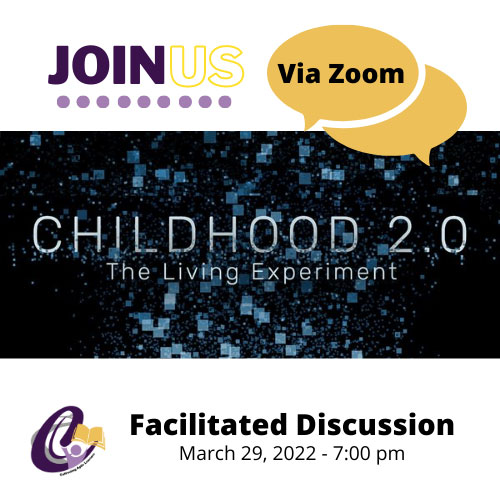Caledonia — When Superintendent Dedrick Martin wanted to hang out with his friends as a kid, he had to “go outside of the house and knock on their door or maybe call them on the telephone.”
Today, kids connect through their devices and social media – just one click away from making plans or unexpected danger. Caledonia Community Schools hosted a virtual discussion about the documentary, “Childhood 2.0,” on the many ways social media impacts young people’s lives.
Released in 2020, the film interviews students and their parents, with expert commentary, about real-life issues facing kids – including mental health and its connection to social media, cyberbullying, online predators and more.
“Because we spend so much of our lives online, it’s important for students to better understand how social media works and how it can negatively impact us, from our thinking and emotions to our relationships with others,” said Martin, who began the discussion.
Families were encouraged to watch the documentary together during midwinter break and were given the opportunity to ask questions during the discussion.
Panelists featured Chris McKenna, founder of the app company Protect Young Eyes; Katey McPherson, director of professional development at app company Bark; Catherine Schmidt owner of Yoga Zen; Dr. Mark Steenwyk, psychologist from Pine Rest; and Caledonia High School senior Stephanie Wrogg. Caledonia Community Schools Student Support Coordinator Katie Dorband moderated the conversation.
‘I don’t want parents to smash their kids’ phones; I want us to seek ways to build trust and conversation.’
– Chris McKenna, founder of Protect Young Eyes
A Caledonia resident, parent and contributor to the Childhood 2.0 documentary, McKenna said “digital trust” starts with parents having conversations with their children about boundaries for social media, internet and device usage.
“It’s not us versus (our children); it’s us with them. We want them to succeed online,” McKenna said. “Technology is a human issue, not just a kids’ issue and it starts with us moms and dads in Caledonia.”
McKenna advised against “spying” on children’s technology and social media, as that teaches kids to become “digital ninjas.”
He added: “Start the conversation with your kids before you jump to protection.”

Taking Steps to Control Access
McKenna also addressed the impact of discovering mature content through social media and the internet on young people.
“Explicit content used to be a destination but we now live in a world where pornography seeks us,” he said. “I don’t want parents to smash their kids’ phones; I want us to seek ways to build trust and conversation.”
McPherson offered Bark, an artificial intelligence app that runs in the background of digital platforms and monitors school issued accounts and family accounts, as an option to help protect students from explicit content and monitor their digital content consumption.
“We would love for all families to not have mysteries in their child’s lives,” she said. “For schools and parents subscribing to a supervisory app like Bark, it takes the heavy lifting out of supervising texts, email, internet searches and apps like Instagram, Discord, YouTube, with limited access to Snapchat.”
McKenna referred to Bark’s parental controls as “a gentle, caring hug and not a cruel hammer of authority.”
According to the U.S. Surgeon General, before the coronavirus pandemic mental health challenges were the leading cause of poor life outcomes for young people, with up to 1 in 5 children ages 3 to 17 nationwide having a mental, emotional, developmental, or behavioral disorder.
Over the last two years, McPherson and her team have witnessed an escalation in online predation and an uptick in depression, anxiety and self harm among young people.
New data in 2021 reported more than a 1 in 3 high school students experiencing poor mental health since the beginning of the coronavirus pandemic.

Learning to Navigate Tech’s Pros and Cons
As a high school student, Wrogg views technology as an asset and sees her peers using screens and social media to “distract from the stresses of being a teenager and stresses of the world.”
“We need a distraction to keep us sane; it provides comfort and familiarity in a world of chaos,” she said, though she sees the downsides too. “The online world is growing in practicality and popularity, but technology is only as effective as you make it and it can have adverse effects on teens.”
Community professionals from Yoga Zen and Pine Rest offered their solutions.
Steenwyk, of Pine Rest, explained how Dialectic Behavioral Therapy teaches distress tolerance skills through the acronym T.I.P.P – temperature, intense exercise, paced breathing and progressive muscle relaxation.
“As a parent, you’re going to make mistakes, but the more we can normalize that big emotions are not bad or dangerous or scary or things we need to run away from, the more comfortable (our kids) become and tolerate whatever comes their way,” he said.
As a yoga instructor, Schmidt explained the benefits of movement and mindfulness and how they can “counteract the negativeness of the internet and social media impacting our youth and all of us.”
“The practice of yoga brings awareness to our body and our thoughts and mindful breathing decreases stress hormones and increases feel-good hormones,” she said. “Taking the time to be mindful slows things down and helps us build emotional resilience and agency.”
In closing, each panelist offered advice for parents to take away and implement in their own lives.
“Go home and talk openly and honestly about your concerns with your kids,” McKenna said. “Lay out your digital fears and work together to find the best solution.”
Martin added: “Our school devices have firewalls and by and large are safe for students. While we’re not perfect, we’re always finding new ways to work with and partner with parents to keep our kids safe in online environments.”









